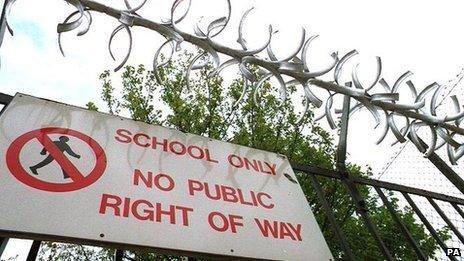Complex admissions allow schools to 'choose' pupils
- Published

Schools have to follow an official admissions code to ensure access is fair
Some schools in England still appear to be selecting pupils by the back door using "unnecessarily complex" admission arrangements, a report says.
The Office of the Schools Adjudicator says too many schools who set and run their own admissions do not comply with Department for Education rules.
Oversubscription arrangements in some schools appear to allow them "to choose which children to admit", it says.
The DfE said it had recently published a streamlined admissions code.
This was to ensure admissions arrangements become even clearer for schools and parents, it added.
'Overly complex'
But in her annual report, external, chief schools adjudicator Elizabeth Passmore said admission arrangements were overly complex for too many schools that are their own admission authority.
This means the school is responsible for setting admissions policies and applying them. These tend to be faith schools and academies.
Ms Passmore said in some cases: "The arrangements appear to be more likely to enable the school to choose which children to admit rather than simply having oversubscription criteria... that are reasonable, clear, objective and procedurally fair."
She did not give details of how many schools had these overly complex arrangements, but did give examples of the types of arrangements she considered to be acceptable and those she feels are too complex.
"The clearest, easiest to understand arrangements typically have between three and six oversubscription criteria with, as required by the code, a suitable tie-breaker if more than one child has equal priority for the last available place," she said.
'Fair access'
And some schools' arrangements are so complicated, that it is not clear how they are actually applied, she said.
She says: "The complex arrangements compared with the clearest have some or all of: numerous oversubscription criteria and sometimes sub-categories within them; different categories of places; more than one catchment area; feeder schools; tens of points available and needed to gain priority; banding and therefore tests to be taken; aptitude assessment; and several faith-based oversubscription criteria.
"For popular schools that set complicated arrangements, especially if they include tests for banding purposes and/or for places allocated for aptitude and/or selective places the first hurdle in gaining a place is to take the test," she adds.
The Department for Education says: "The chief adjudicator plays a vital role in ensuring school admission arrangements are fair and that the basic principle of fair access for all is upheld.
"The system appears to be working well with objections this year equating to just 1.3% of all state-funded schools, but we are not complacent and recently published a streamlined admissions code to make arrangements even clearer for schools and parents.
"Our plan for education is designed to ensure every child is able to go to a good local school. The chief adjudicator has a vital role to play in delivering this aim."
- Published29 November 2013
